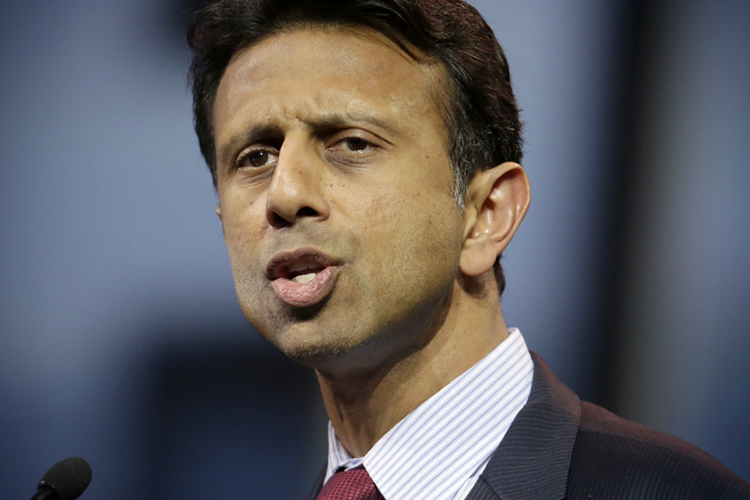In the months following the 2012 election, Louisiana Gov. Bobby Jindal tried to position himself as the responsible, forward-looking Republican who could embody the GOP’s vision for the future. “We’ve got to stop being the stupid party,” Jindal said in January 2013, arguing that Republicans “need to change just about everything else we are doing.” The party heard Jindal’s reprimand and basically said, “Ehhhhh, no we’d rather be stupid for a little longer,” so Jindal caved and rejoined the ranks of the imbecilic.
No longer content to simply live among the stupid, Jindal now wants to be their leader against the forces of smart. Writing for FoxNews.com this week, Jindal chastised the growing number of clear-eyed political observers who see little chance of repealing the Affordable Care Act. Of particular note was his attack on the quote-unquote “thinkers” in his own party who he says are too quick to give up the repeal crusade:
But even many conservative “thinkers” in Washington have given in to ObamaCare fatalism. They may not say so in public, but they fully believe that talk of the law’s repeal exists only in the land of unsophisticated rubes.
The country that won two world wars and put a man on the moon cannot, it is believed, repeal a disastrous public policy. Says who? Why not?
There you have it. Bobby Jindal, who once exhorted his party not to be stupid, is now attacking conservatives who “think.”
Jindal’s attempt to reinvigorate the flagging movement for repeal feels like a desperate act by a man who can’t come to grips with the fact that the cause is lost, like a post-World War II holdout or someone who pronounces .gif with a soft “g.” Flailing against “the elite salons of Washington” and the “conventional wisdom on the cocktail circuit” is good populist fun, but it simply masks the fact that Jindal can’t lay out a viable pathway to full repeal.
Instead, Jindal touts his own replacement plan for Obamacare, arguing it will “focus like a laser beam on reducing costs.” What he leaves out is the fact that repealing the Affordable Care Act and replacing it with his vision for healthcare reform will strip coverage from millions of people who gained it under the ACA, and ensure that a good number of the freshly uninsured will be priced out of the health insurance market.
And it’s not just dirty collectivist liberals who are making that argument. Conservative policy analysts pored over Jindal’s health plan and found it lacking.
“Replacing Obamacare with [Jindal’s] plan would probably result in millions of people losing their coverage, and I think that would doom it,” wrote Ramesh Ponnuru at National Review. “If you replaced Obamacare with Jindalcare in 2017, you’d see a coverage expansion relative to the Bush era, but a large number of the newly-insured would lose their coverage without any immediate prospect of regaining it,” observed Ross Douthat at the New York Times. Analyses like these, however, are the product of “thinking” and thus aren’t germane to the healthcare debate Jindal wants to have.
Jindal’s bid to be commander of the anti-thinking legions is fortuitously timed, as it coincides with Indiana Gov. Mike Pence’s shaky transition from Obamacare nemesis to uneasy ally. Pence, who voted against the Affordable Care Act as a congressman, wants to use funds made available by the ACA to expand health coverage for low-income residents of his state. He’s trying to be cute about it and convince conservatives (largely without success) that he’s not inflicting Obamacare on innocent Hoosiers, but his willingness to work with the law is a strong indicator that Jindal’s hard-line repeal movement is done for.
Consider the differences in the approaches taken by each governor, both of whom are severely conservative and both of whom have presidential aspirations. Jindal’s animus toward the ACA is such that he has no problem tearing it out root and branch, leaving the newly insured in his state and elsewhere uncertain of their future. Pence, on the other hand, argues that the political debate over Obamacare is, at this point, secondary to the livelihoods of his constituents. “We’re talking about real people, working people who deserve a better way,” Pence said during a recent speech at the American Enterprise Institute, arguing that his responsibility was to help people “caught in that gap where their income simply doesn’t give them the ability to purchase health insurance for themselves or for their families.”
You can ding Pence for rejecting the Medicaid expansion and creating that gap in the first place, but delayed action is better than none at all. Jindal, meanwhile, patiently endures the suffering of the more than 240,000 people in Louisiana’s Medicaid coverage gap while he tries to breathe life into a dying political movement.
That’s pretty stupid.

